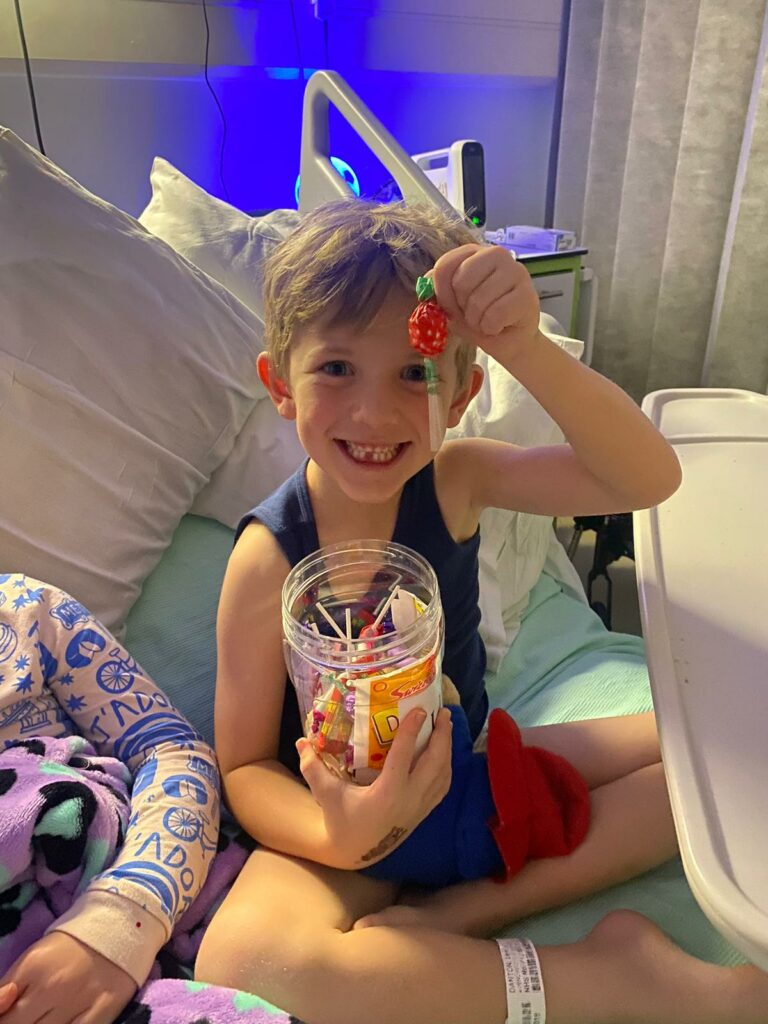Lewis’ Story

Last summer, six-year-old Lewis from Aberaeron was a healthy, energetic little boy who loved playing football and spending time outdoors. But with very little warning, everything changed.
It all began when Lewis started to complain of leg pain after a football game. His parents, Liz and Alex, weren’t overly concerned at first, after all, growing pains are common in young children. Their GP agreed, and for a while, things seemed to settle down. But in September, Liz noticed something wasn’t right.
Lewis’ mum Liz said: “It looked like he wasn’t running properly. It was almost like he was taking the mic out of how he normally ran or like he was shuffling.”
Worried, they took him to A&E where scans and blood tests came back clear. An orthopaedic specialist suggested it could be a sporting injury and sent the family home. But within a week, Lewis’s walking had worsened, but strangely, the pain had disappeared. Then one day, Lewis suddenly lost the ability to walk altogether.
The family rushed to Carmarthen Hospital, where an MRI and lumbar puncture showed high protein levels. Lewis was urgently transferred to the Noah’s Ark Children’s Hospital for Wales with suspected Guillain-Barré syndrome (GBS), a rare neurological disorder where the immune system attacks the peripheral nerves, causing weakness, paralysis, and difficulty breathing.
At Noah’s Ark, Lewis’s condition deteriorated quickly. He began infusions to stop the paralysis from spreading to his upper body, but he had to spend four weeks on Island Ward learning to walk again. After briefly returning home, Lewis relapsed just two weeks later. This time, the condition advanced even faster, leaving him with limited movement in his arms and chest and struggling to breathe.
Lewis was given IVIG treatment, a process involving antibodies from donated blood to help stop the immune attack. When that didn’t improve things, doctors began weekly eight-hour steroid infusions. The treatment worked, but it meant spending Christmas in hospital, away from home, friends, and his sister, Libby.
Liz recalls, “Lewis went from being a sporty, outgoing boy to being confined to a bed. Losing all movement from the waist down and took a bit of his cheeky self with it. He was so sick from treatment and suffered terrible headaches, often the only thing he could bear was sitting in a dark, quiet room.”
Hospital life was overwhelming, and Lewis developed a severe fear of needles and procedures.
Liz said: “He would panic every time a doctor or nurse came into the room. We dreaded the next test, the next cannula, it broke our hearts.”
Then one day, Polly, one of the hospital’s play specialists, came to meet Lewis.
Liz said: “She introduced herself gently when Lewis wasn’t feeling great. She offered some sensory lights for the room and some LEGO for when he was ready. A few days later, she came in before a blood test, explained everything clearly and visually, and stayed with him throughout. That was the turning point, he trusted her completely from then on.”
From that moment, Polly became a huge part of Lewis’s hospital journey. She attended every blood test, helping Lewis stay calm and feel safe. She turned scary moments into opportunities for reassurance and laughter.
During his hospital stay, Polly made sure that Lewis didn’t miss out on the fun milestones of childhood. She decorated the ward for Halloween, found him a costume, and organised crafts and games. And when he was too weak to walk, Polly bought the playroom to Lewis’ bedside.
Liz said: “Lewis couldn’t wait for the afternoons when he could spend time with Polly. They’d go for little walks which gave me time to rest. For Lewis, it was pure joy. Although he hadn’t regained his mobility at that point, he definitely regained his sparkle.”
Polly’s support extended to Lewis’ sister too. She including Libby in craft activities during visits and helping the siblings to make gifts for Mother’s Day, all of which helped to lift everyone’s spirits when hospital life felt heavy.
Liz said: “After spending seven months in hospital, Polly became like family. Without her, I think every treatment would have been traumatic for Lewis. Polly made it possible for us all to smile again.”
Through our Power of Play campaign, we’re celebrating the life-changing impact that the Noah’s Ark play team have on young patients like Lewis, providing comfort and confidence to children when they need it most.
Asked what he thinks of his friend Polly, Lewis said: “Polly took my pain away by making me happy, and we went on fun walks.”







